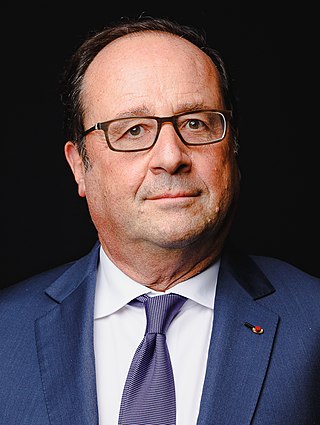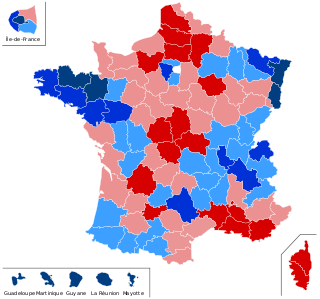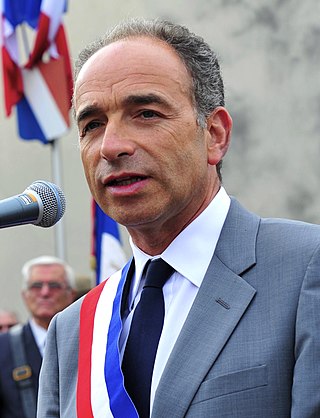
The Rally for the Republic was a Gaullist and conservative political party in France. Originating from the Union of Democrats for the Republic (UDR), it was founded by Jacques Chirac in 1976 and presented itself as the heir of Gaullist politics. It was one of the two major parties in French politics, alongside the Socialist Party. On 21 September 2002, the RPR was merged into the Union for the Presidential Majority, later renamed the Union for a Popular Movement (UMP).

The Union for French Democracy was a centre-right political party in France. The UDF was founded in 1978 as an electoral alliance to support President Valéry Giscard d'Estaing in order to counterbalance the Gaullist preponderance over the political right in France. This name was chosen due to the title of Giscard d'Estaing's 1976 book, Démocratie française.

Regional elections in were held in France on 21 and 28 March 2004. At stake were the presidencies of each of France's 26 regions which, although they do not have legislative powers, manage sizeable budgets. The results were a triumph for the parties of the left, led by the French Socialist Party (PS) in alliance with minor parties, including the French Communist Party (PCF), the Left Radical Party (PRG) and The Greens. The left has usually fared moderately well in regional elections, but this was their best result since the regional system was introduced.

Legislative elections were held in France on 10 June and 17 June 2007 to elect the 13th National Assembly of the Fifth Republic, a few weeks after the presidential election run-off on 6 May. 7,639 candidates stood for 577 seats, including France's overseas possessions. Early first-round results projected a large majority for President Nicolas Sarkozy's Union for a Popular Movement (UMP) and its allies; however, second-round results showed a closer race and a stronger left. Nevertheless, the right retained its majority from 2002 despite losing some 40 seats to the Socialists.

Legislative elections were held in France on 16 March 1986 to elect the eighth National Assembly of the Fifth Republic. Contrary to other legislative elections of the Fifth Republic, the electoral system used was that of party-list proportional representation.

Legislative elections were held in France on 12 and 19 March 1978 to elect the sixth National Assembly of the Fifth Republic. On 2 April 1974, President Georges Pompidou died. The non-Gaullist centre-right leader Valéry Giscard d'Estaing was elected to succeed him. Because the Gaullist Union of Democrats for the Republic was the largest party in the pro-Giscard majority in the Assembly, Giscard chose Jacques Chirac to lead the cabinet. This period was one of renovation for Gaullism.

A referendum on the Maastricht Treaty for the founding of the European Union was held in France on 20 September 1992. It was approved by 51% of the voters. The result of the referendum, known as the "petit oui", along with the Danish "No" vote (50,7%) are considered to be signals of a transition of public opinion on European integration, away from the "permissive consensus" which had existed in most member states until then. From this point forward issues relating to European integration were subject to more intensive discussions across much of Europe, and later overt euroscepticism gained prominence. Only France, Ireland and Denmark held referendums on the Maastricht Treaty ratification.

Municipal elections were held in France on 11 and 18 March 2001. These elections were marked by a setback for the left and a victory for the right one year before the 2002 presidential election. However, the capital, Paris and the second largest city, Lyon both switched to the left.

The French municipal elections of 2008 were held on 9 and 16 March to elect the municipal councils of France's 36,782 communes. The first task of each newly constituted municipal council was to elect a mayor.

Jean-François Copé is a French politician serving as Mayor of Meaux since 1995 with an interruption from 2002 to 2005. He was Government Spokesman between 2002 and 2007, when assumed other tenures in the government—including Minister of the Budget—at the same time. He also served as the member of the National Assembly for the 6th constituency of Seine-et-Marne and president of the Union for a Popular Movement (UMP) group in the National Assembly. In November 2010 he became the party's secretary-general. In August 2012 he announced that he would run for the presidency of the UMP, facing the former Prime Minister François Fillon.

Regional elections were held in France on 15 March 1998. At stake were the presidencies of each of France's 26 regions, which, though they don't have legislative autonomy, manage sizeable budgets.

The politics of Rhône-Alpes, France takes place in a framework of a presidential representative democracy, whereby the President of Regional Council is the head of government, and of a pluriform multi-party system. Legislative power is vested in the regional council.

The Left Front was a French electoral alliance and a political movement created for the 2009 European elections by the French Communist Party and the Left Party when a left-wing minority faction decided to leave the Socialist Party, and the Unitary Left, a group which left the New Anticapitalist Party. The alliance was subsequently extended for the 2010 regional elections and the 2012 presidential election and the subsequent parliamentary election.

Regional elections were held in France on 14 and 21 March 2010. At stake were the presidencies of each of France's 26 régions, which, though they do not have legislative autonomy, manage sizable budgets.

The National Centre of Independents and Peasants is a right-wing agrarian political party in France, founded in 1951 by the merger of the National Centre of Independents (CNI), the heir of the French Republican conservative-liberal tradition, with the Peasant Party and the Republican Party of Liberty.

Legislative elections were held in France on 10 and 17 June 2012 to select the members of the 14th National Assembly of the Fifth Republic, a little over a month after the presidential election run-off held on 6 May.

Legislative elections were held in France on 11 and 18 June 2017 to elect the 577 members of the 15th National Assembly of the Fifth Republic. They followed the two-round presidential election won by Emmanuel Macron. The centrist party he founded in 2016, La République En Marche! (LREM), led an alliance with the centrist Democratic Movement (MoDem); together, the two parties won 350 of the 577 seats—a substantial majority—in the National Assembly, including an outright majority of 308 seats for LREM. The Socialist Party (PS) was reduced to 30 seats and the Republicans (LR) reduced to 112 seats, and both parties' allies also suffered from a marked drop in support; these were the lowest-ever scores for the centre-left and centre-right in the legislative elections. The movement founded by Jean-Luc Mélenchon, la France Insoumise (FI), secured 17 seats, enough for a group in the National Assembly. Among other major parties, the French Communist Party (PCF) secured ten and the National Front (FN) obtained eight seats. Both rounds of the legislative election were marked by record low turnout.
This page lists public opinion polls conducted for the 2012 French legislative elections, which were held in two rounds on 10 and 17 June 2012.
This page lists public opinion polls conducted for the 2007 French legislative elections, which were held in two rounds on 10 and 17 June 2007.
This page lists public opinion polls conducted for the 2015 French regional elections, which were held in two rounds on 6 and 13 December 2015.
















